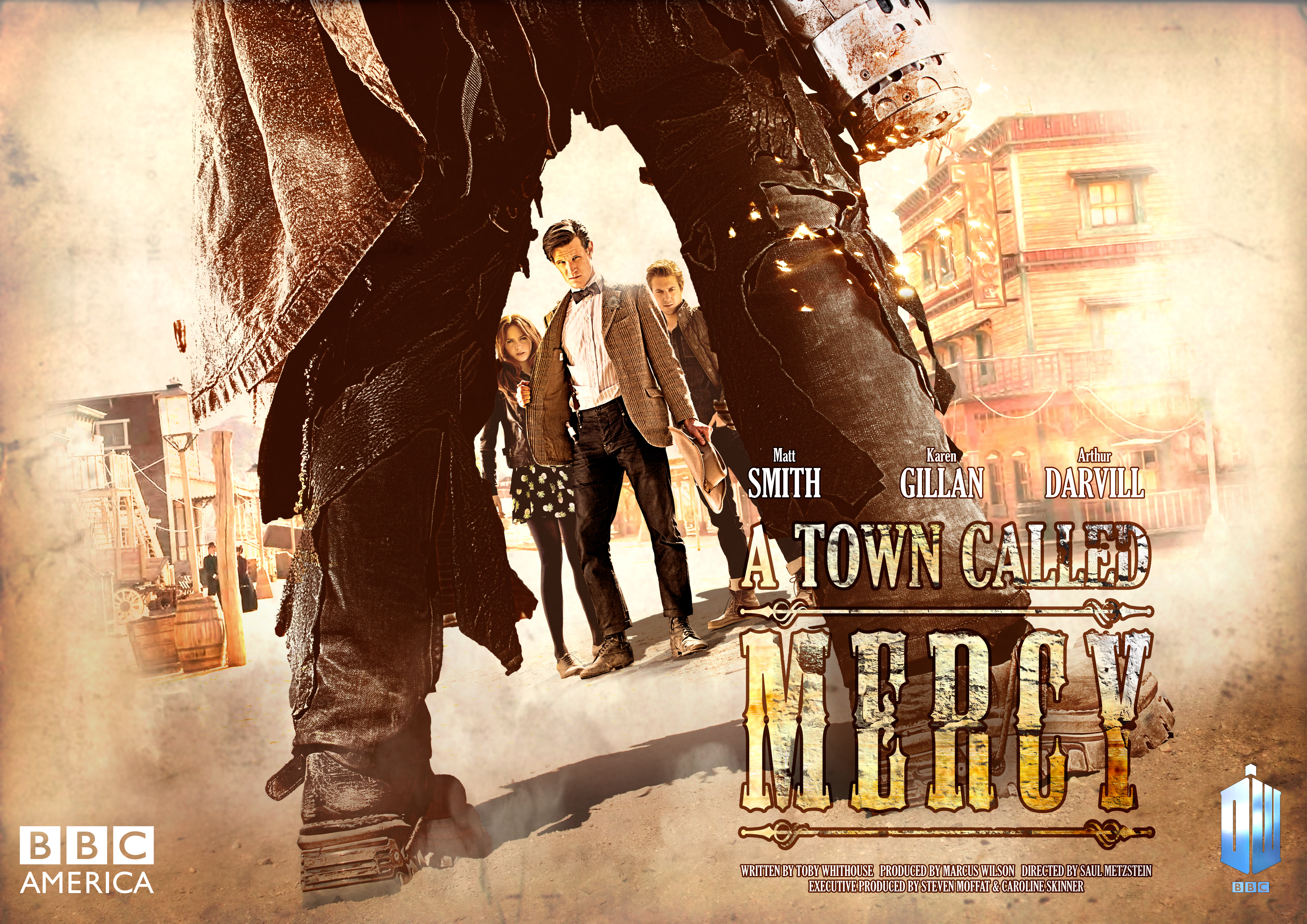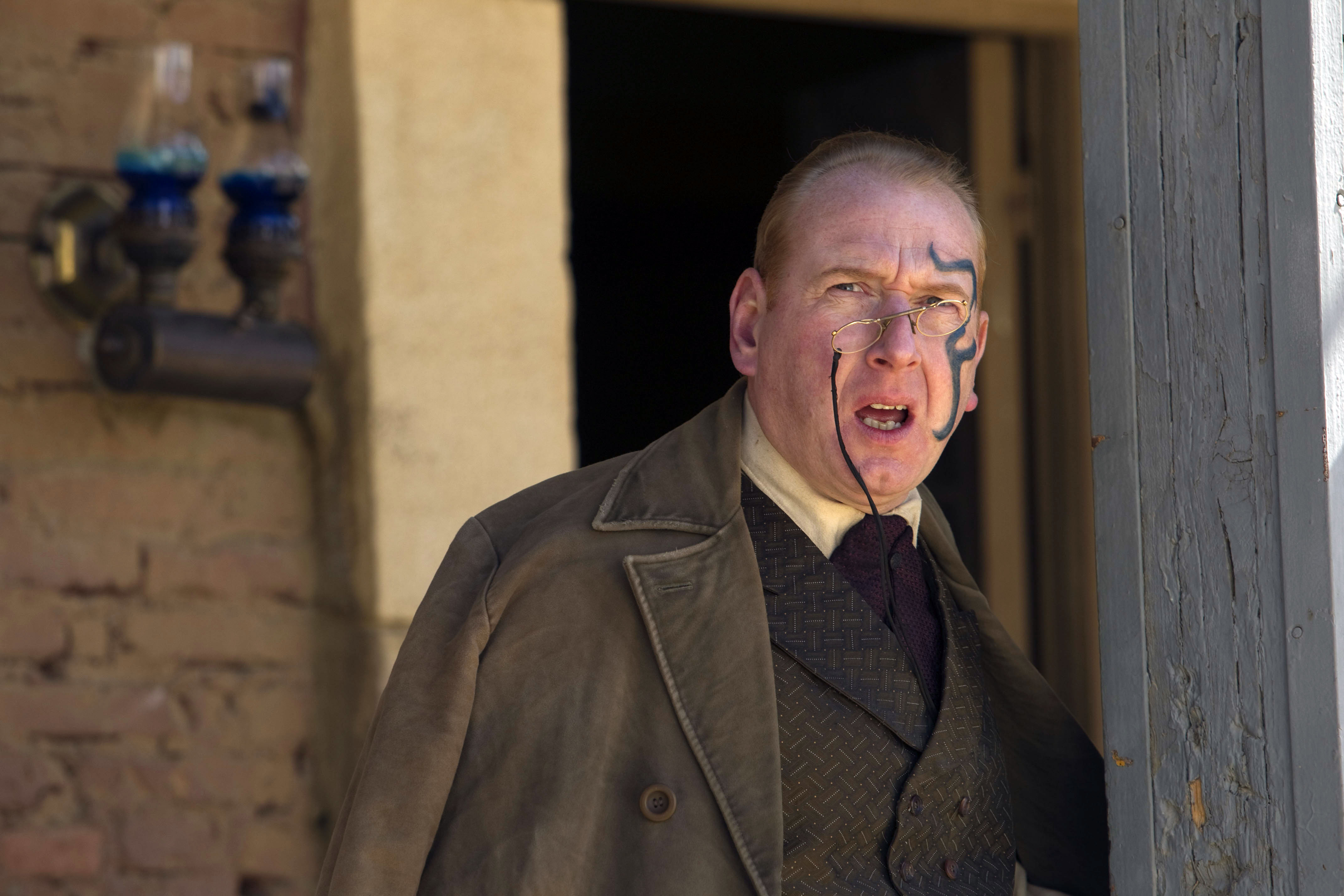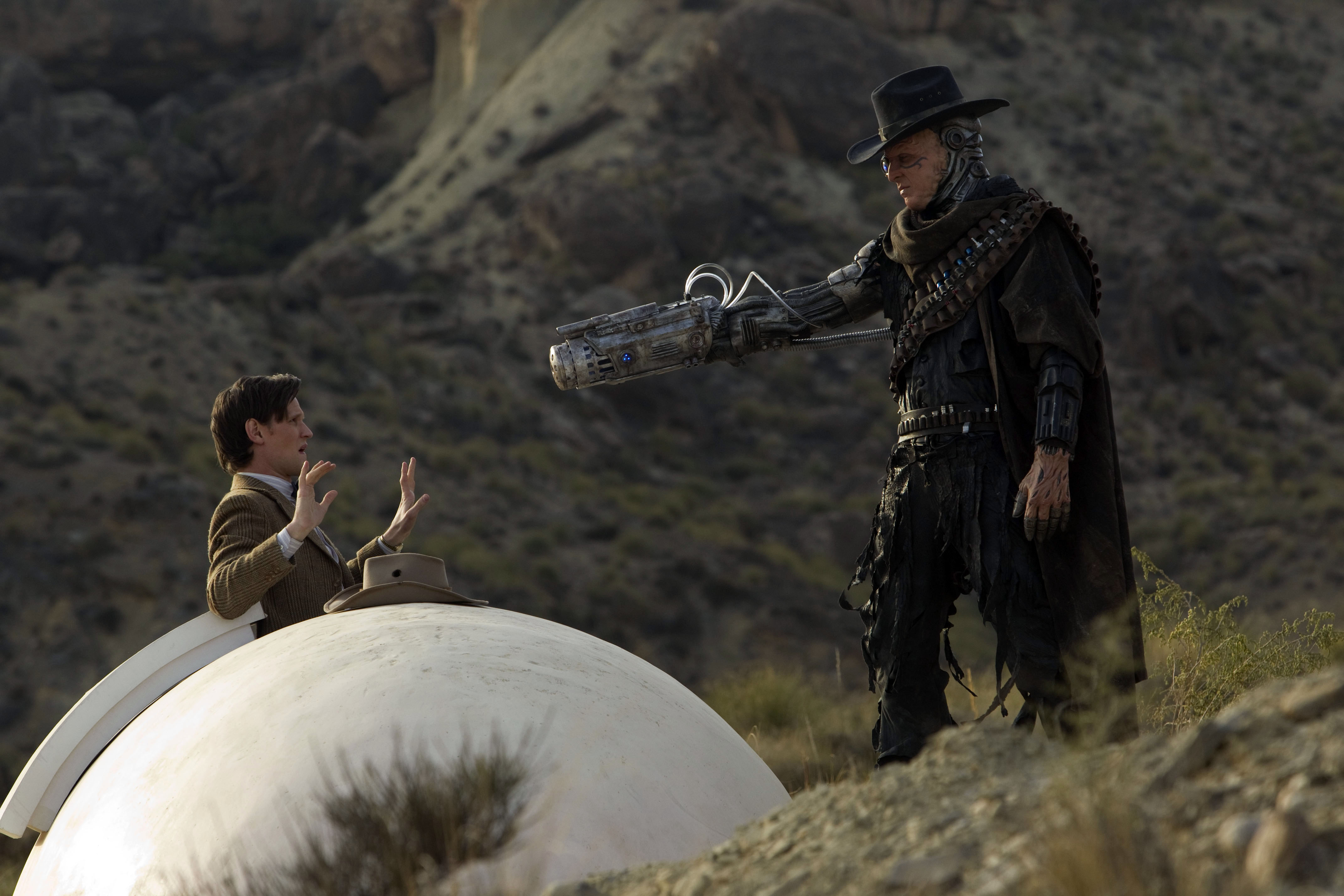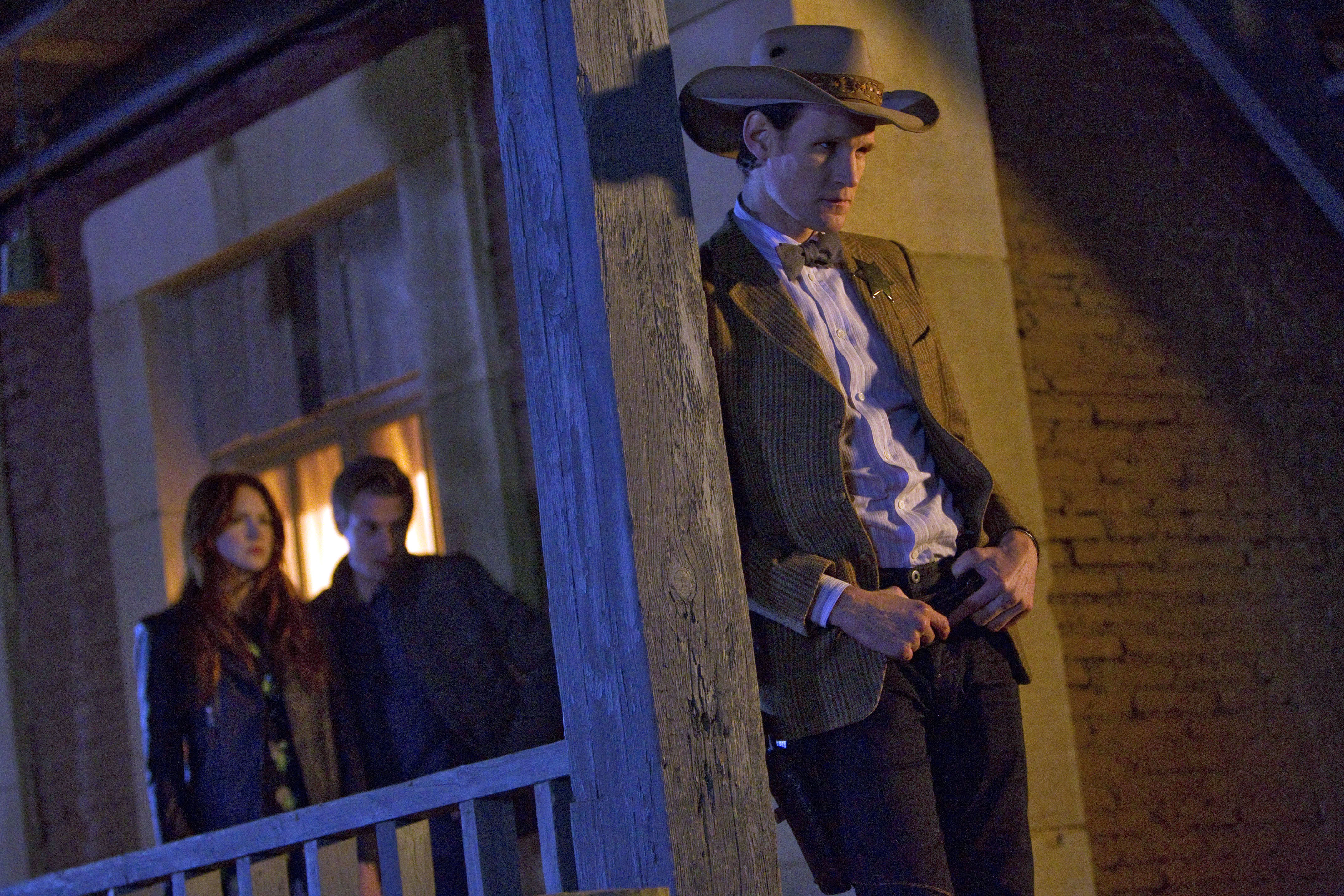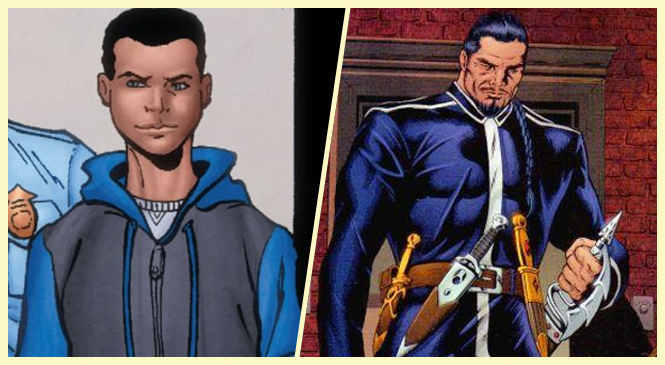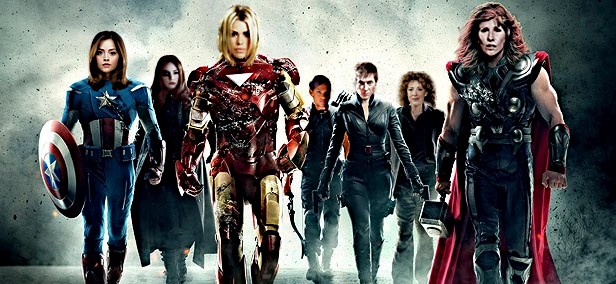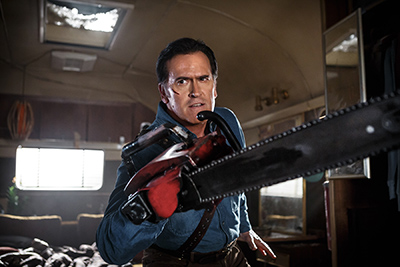Mr. Harvey And The Doctor's MERCY

Episode 7.03 “A Town Called Mercy.”
[All photos: Adrian Rogers, © BBC]
Hello again! Here you shall find your Mr. Harvey’s thoughts on the latest two episodes of the seventh series of Doctor Who, “A Town Called Mercy” and “The Power of Three”, and like the first two episodes of this season, it is, sad to say, a mixed bag. Like those two, these episodes have a lot of good things going on, and like their predecessors, have some real issues as well.
I have to say I’m not sold on this seasons “No two-parters/no story-arc” plan, and, while the idea of making each episode a “blockbuster” sounds good, it’s been uneven to say the least. First we had the half-brilliant “Asylum of the Daleks”, with the other half just a mess, and then the far superior, yet uneven “Dinosaurs on a Spaceship”. Now we have the quite good “Town…”, followed by the, mmmm, 1/3rd excellent “Power…”, and I’m wondering if this is how the rest of the season is going to play out, with every other episode making me bang my head against the computer.
The big problem for me so far is the wildly uneven writing, and some of the plot holes that have made it in. The force field of “Asylum” for example, and now the giant plot holes of “The Power of Three.” Sure, last season had its bad episodes like “The Wedding of River Song”, but it also had “The Girl Who Waited”, “The Doctor’s Wife”, “A Good Man Goes To War” and “The God Complex”. So far, the best of this season would be “Dinosaurs On A Spaceship” and “A Town Called Mercy”, and at 50% of the episodes… well. Admittedly there were some great moments in “Wedding…”, like Rory’s stand against the Silence, just like there were some great moments in “Asylum…” and “The Power of Three”, but… anyway. Let’s dive in, shall we?
The Doctor hasn’t really spent a lot of time in the Old West since he hit the screen in 1963, and to find an episode set entirely there, I think we’re looking at 1966’s “The Gunslingers”, with Hartnell’s First Doctor. That wasn’t one of the classic stories of the first run of Who, and I’m pleased to say that the Doctor’s return to the 1800’s frontier is much better. Shot in Spain, like the majority of the classic western films, the production design, costume design and overall visual feel of the episode is excellent, and combined with the almost old-school morality play of the story, makes for an interesting blend of the Western and Science Fiction genres.
And it is a tale of morality. When the Doctor, Amy and Rory find themselves detoured by the TARDIS from their Day Of The Dead plans, they discover a town where the residents are under siege from a mysterious Gunslinger, a half-man, half-machine, a creature hunting for “The Doctor”. As in “Dinosaurs…”, it’s not THE Doctor the Gunslinger is after, but the town’s doctor, who turns out to be an alien with something of a checkered past, and a very good reason to fear the cyborg who is demanding that the townspeople turn him over.
Kahler-Jex is an interesting character, for a number of reasons. With his ship crashed in the desert, he becomes the town’s doctor, taking care of the populace for the last ten years, curing a cholera outbreak and wiring the town for electricity. He’s built up a lot of good will, so much so that the townspeople and the marshal even are aware of his being an alien from another world, and they simply don’t care. But those good deeds lie on top of a past filled with blood and war, a past that has come back to haunt him in the form of the Gunslinger.
You see, Jex was a scientist who, with a team of doctors and other scientists, turned a number of volunteers into living weapons to help end a vicious war tearing his world apart. Unfortunately, the scientists weren’t exactly honest with the volunteers, and the cyborg killing machines, while extremely effective at ending the war, became brutal monsters that were “decommissioned” at the end of the conflict. Since “decommissioned” in such a situation is likely a euphemism for “shut down”, “terminated” or “disposed of”, the blood on Jax’s hands is pretty significant, both for the victims of the cyborgs and the “volunteers” themselves.
Well, all but one. For the Gunslinger is the last of the cyborgs, whose programming went awry and whose memories of who he was and what he’s done has driven him to track down those who turned him into a monster and exact his revenge, until only Jax remains. This tormented creature, once known as Kahler-Tek, has no wish to harm the townspeople, but he will have his revenge. First cutting off the town from the outside world, he hoped to force them to give Jax to them, but found the town’s loyalty to their doctor too great. But his patience has run out, and the arrival of the TARDIS crew will only accelerate the countdown to his revenge. He’s a tragic creature… on one hand, he has no desire to harm the innocent, but on the other, whatever good Jax has done in Mercy, he cannot forgive or forget his crimes.
It makes for quite the nice contrast between Jax and Solomon, the villain of “Dinosaurs On A Spaceship”. Solomon was an unredeemable monster, Jax is much more a shades-of-grey character, someone who knows the horrors he has committed, and is trying to make something like amends through his work in Mercy. What seems to be acts of genocide in the course of a brutal war versus the saving of lives and improving the quality of life in his adopted home. Can such a man find mercy? Forgiveness? Is he always a monster, or can he be redeemed?
There’s been mixed reactions around the net as people watched the Doctor drag Jax out of the town and throw him out into the path of the Gunslinger. To when the Doctor grabbed a gun and threatened to kill Jax himself. A lot of “Wow, the Doctor is really kind of losing it”, or something akin to Amy’s comment about how he loses his “humanity” when he travels alone too long. I… completely disagree.
Folks, the Doctor is a mass murderer. He committed genocide, not once, not twice, but over the course of the entire run of the series, new and old? Over and over again. Oh he never did it lightly, but the idea that the Doctor is some innocent, who never resorts to violence to save the day is hardly accurate. Sylvester McCoy’s 7th Doctor sent the Hand of Omega to destroy the Dalek’s homeworld of Skaro, essentially (at the time anyway) destroying the entire race. Before the new series started, the Doctor, apparently Paul McGann’s 8th Doctor, fought on the front lines of the Time War, and, to save the universe, killed his own people and the Daleks. Not some of his own people, not some of the Daleks. ALL OF THEM. He saw the monsters both races had become, and he killed them ALL.
That, boys and girls, is kinda the definition of genocide.
Our hero, simply, is a monster.
And he’s keenly aware of it. That’s the point really. He knows he has killed, he knows he’s become The Destroyer Of Worlds. He’s been carrying that guilt since the series returned with “Rose”. He does what he does, saving everyone he can, people and planets, societies and civilizations, carrying around the guilt of wiping out his own species to save the universe. Last season he saw that he wasn’t the only one who saw him that way, and thus we have the Silence and Madame Kovarian. We saw Davros accuse him of turning his companions into living weapons in the 10th Doctor’s “Journey’s End”, and it shook him, seeing that those around him have become willing to destroy much to save the world, something he has directly caused by being in their lives.
But these have never been easy decisions for the Doctor to make. He never kills lightly, he always looks for another way, he always tries to save life, not destroy it. And when he does make those decisions, where he kills, he does it knowing, knowing, what he’s done. And he remembers.
And that is why his dragging Jax out to give him to the Gunslinger makes perfect sense to me. That’s why his pulling a gun and almost shooting Jax himself makes perfect sense to me. Because, lads and lasses…
He’s looking in a mirror.
Jax IS the Doctor. He’s a man who, in order to save lives, caused massive amounts of death. He’s a man who carries that guilt with him every day, and who tries, however he can, to be someone who is worthy of forgiveness, someone who is worthy, pardon the pun, of Mercy. Sure the details are different, but looking at Jax, the Doctor sees himself, and I’m really surprised that more people haven’t seen that. It’s been made clear by the 9th, 10th and 11th Doctors that the one person the Doctor actually likes the least is himself. His own guilt, his own knowledge of the blood on his hands, the times he’s failed… No wonder he rails against his showing mercy to the Daleks, the Master and every other foe he’s faced, no wonder he says this time it’s for the their victims. Because he’s looking in a mirror.
Amy is right about the effect his companions have on him, I’ll grant you. The Doctor needs his human friends. He needs their hope and wonder, their excitement and yes, their moral support to remind him that he is, ultimately a good “man”, no matter what terrible decisions he’s had to make. Otherwise it’s clear that his self-loathing and his despair, his crushing loneliness, does push him to forget to follow his path of always looking for the peaceful solution. The Doctor alone hurts too much.
One of Jax’s reasons for seeking redemption is religious. His people believe that they must carry the souls of those they have wronged up a mountain, and Jax fears that the weight of all those dead because of him will be unbearable. We don’t know much about Time Lord religion, with the only real exploration happening in the Virgin Novels in between the series, and those are not exactly canon. But imagine the Doctor, carrying the weight of all those he’s killed, all those he’s failed to save. Yeah.
Religion doesn’t make much of a serious appearance in Who much, not on any major level anyway. Last season’s Muslim character in “The God Complex” was the rare exception, and here we have Jax’s religious beliefs and even a preacher who gives us a prayer, then stands between the Gunslinger and his parishioners, futile as that would be. Then as now, the religions and faiths, real and imagined are treated with respect, and that’s always nice to see, especially in these troubled times.
Other than such, oh god here comes another unintended pun, weighty matters… sorry folks, had to. Other than that, we had Ben Browder! Ok, I am a HUGE Farscape fan, and if I can’t have more of that tragically cut short show, it’s great to see Ben on one of my other favorite shows. He certainly doesn’t disappoint here, playing Marshal Isaac, a good Biblical name for a morality play by the way, playing him as a man who is doing the best he can for his town and its people. He’s faced with aliens and cyborgs and all sorts of things that could freak the hell out of a lot of people, and yet he keeps his head and always does what he thinks is right. And then he gets killed for his trouble, trying to save Jax.
Damn you, Science Fiction, quit killing Ben Browder! Sigh. Sorry, it’s a Farscape thing. You had to be there.
Anyways! Excellent performance from Ben, and from Adrian Scarborough as Jax. It’s not easy to play the kind of character who is not good and not evil, but has to be a little of both to make it work, and get that across in 45 minutes. He pulls it off. And also praise must be given to Andrew Brooke, playing the Gunslinger. That kind of extensive makeup and prosthetics is really hard to act through, but he conveyed the anger and tragedy of the character quite well. And of course our Doctor, Amy and Rory turned in their usual excellent performances.
Ok folks, I’ll return shortly with my review of “The Power of Three”, or as I like to call it, “The Ghost Of Russell P. Davies”, which may give you an idea of what I think of the episode, as we continue our countdown to the exit of the Ponds and the arrival of our new Companion.
And there you have it. Thoughts?
[“Doctor Who” on the BBC web site] [“Doctor Who” on BBC America]

